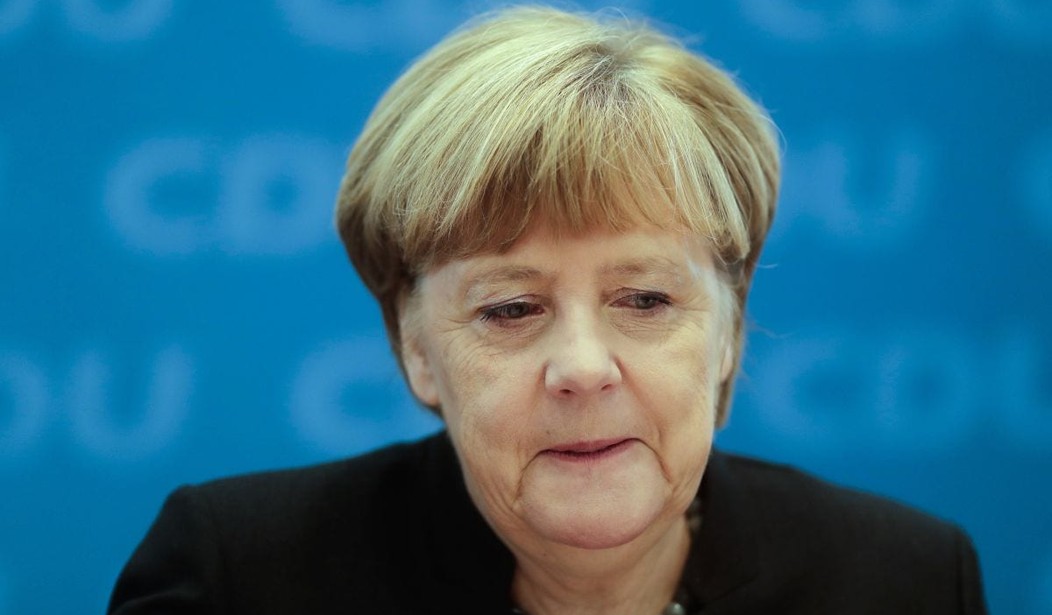German Chancellor Angela Merkel was out campaigning today in advance of Sunday’s vote for parliament. Her coalition of conservatives and social democrats is expected to defeat the socialists by double digits.
But a poll released on Friday shows that both Merkel and socialist leader Martin Schulz are losing support. And with a third of the German electorate undecided, the nationalist Alternative for Germany party is picking up momentum.
German Chancellor Angela Merkel, poised to win a fourth term in Sunday’s election, and her center-left challenger Martin Schulz urged supporters on Saturday to keep fighting for votes with a third of the electorate still undecided.
Merkel is widely expected to cruise to re-election with the Schulz’s Social Democrats trailing by double digits but the far-right Alternative for Germany (AfD) could emerge as the third largest party, complicating the outlook for her next coalition.
A new INSA poll published by Bild newspaper showed sliding support for Merkel’s conservatives, who dropped two percentage points to 34 percent, and the SPD, down one point to 21 percent – both now joined in an unwieldy “grand coalition”.
The anti-immigrant AfD, meanwhile, rose two percentage points to 13 percent, cementing its bid to be the first far-right party to enter parliament since the end of World War Two.
Merkel urged supporters to drum up votes by focusing on conservatives’ efforts on behalf of families, a pledge to avoid tax increases and emphasis on increasing security in Germany.
The Christian Democratic leader also lauded the role of the European Union in providing stability in “a troubled world”.
“We want to boost your motivation so that we can still reach many, many people today. Many are still undecided,” Merkel said before heading north to her home constituency.
In Greifswald, she led a crowd in practicing CPR as loudspeakers blared the Bee Gees song “Stayin’ Alive”.
Needless to say, she’s not generating a lot of excitement. Nor is Schulz, whose party platform sounds a lot like their counterparts in America:
Schulz asserted that Merkel was “a world champion in not deciding,” someone who simply parroted others’ ideas.
He vowed to push for further reforms, including better elderly care facilities, affordable housing, an end to discriminatory practices that harm children of migrants, and free child care.
Merkel is so worried about AfD that her government is raising the specter of Nazis taking over the party:
Merkel’s interior minister, Thomas de Maiziere, told Internet provider t-online.de the government would combat “Islamist terrorism” by strengthening European borders and bolstering security at home.
He criticized the AfD as “a wolf in sheep’s clothing” and said Germany’s BfV domestic intelligence agency was studying “whether right-wing extremists are seizing power and exerting influence on the party”.
The AfD was founded in 2013 with the original goal of opposing large bailouts of financially strapped euro zone countries but from 2015 shifted its focus to immigration.
Mainstream parties have ruled out governing with the AfD.
It has come under increased scrutiny in recent weeks after its top candidate Alexander Gauland said the German integration minister should be dumped in her parents’ homeland of Turkey, and that Germans should be proud of what their military did in World War One and Two.
Jewish and Muslim groups say the AfD’s rhetoric has opened the door to more hate speech and anti-Semitism.
Josef Schuster, president of the Central Council of Jews in Germany, told Reuters he feared the AfD’s entry into parliament would change the public tone in Germany. “I worry that the AfD will aggressively deepen divisions in our country,” he said.
The AfD, which has already won seats in 13 of 16 state legislatures in Germany, has promised to reenergize debate in the federal parliament after four years of what it calls “boring” rule by Merkel’s grand coalition.
AfD executive board member Georg Pazderski told Reuters the party was seeing a huge increase in support. “People are no longer ashamed to come to the AfD and to identify with the AfD.”
Merkel will fall far short of a majority, which means another coalition government. But her social democrat partners might not win enough seats to push her over the top, so she will probably have to form a different coalition — perhaps with the pro-business Free Democrats and/or the Green Party.
The unprecedented entrance of a nationalist party into the German parliament should make things interesting in the coming years.









Join the conversation as a VIP Member